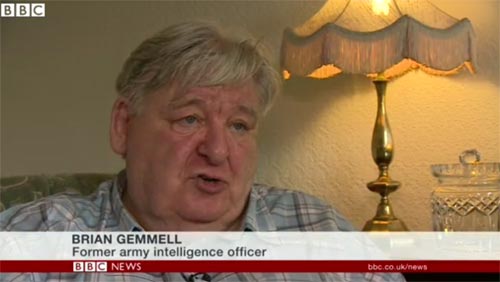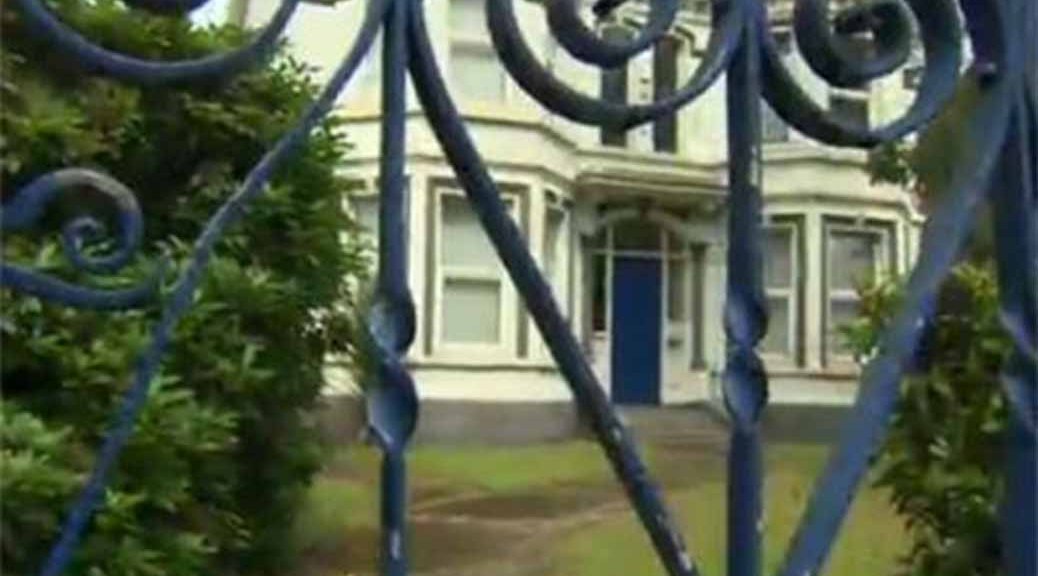I saw a video on the BBC news website yesterday that kept me tossing and turning most of the night. It’s a piece about army intelligence officer, Brian Gemmell, who was gathering information on loyalists in Northern Ireland during the troubles in the 1970s, when he stumbled across evidence of child abuse at Kincora Boy’s Home in east Belfast.

‘ A former army intelligence officer has said he was ordered to stop investigating allegations of child sexual abuse at a boys’ home in the 1970s.
Brian Gemmell said a senior MI5 officer told him to stop looking into claims of abuse at Kincora Boys’ Home in east Belfast.
He said he presented a report on the allegations to the officer in 1975.
In 1981, three senior care staff at the home were jailed for abusing 11 boys.
It has been claimed that people of the “highest profile” were connected to abuse at the home .’
Kincora abuse investigation stopped by MI5 says ex-army officer
Gemmell presented his report to the senior MI5 officer in charge of the investigation and was summoned to go and see him.
‘I went up thinking he was going to be pleased with me. He bawled me out. He was rude and offensive and hostile.
He told me not just to stop any investigation into Kincora, but to drop Royal Flush [an agent he was running].’
According to former Army Press Officer, Colin Wallace:
‘Paedophile groups in the 70s formed very close alliances, purely for protection if nothing else. And it may well be that some of those links are very important when we think of why, for example, the army and the police were not allowed to take action.’

What does he mean by that exactly and why should I care? I have only visited Belfast once on a day trip and have been lucky enough never to have been the victim of any kind of paedophile abuse. So what was it about this that stopped me from getting to sleep?
The image I couldn’t get out of my mind was Gemmell being bawled out by his superior and told to stop the inquiry. It’s a familiar theme in most TV detective dramas, there were at least half a dozen beautifully illustrated examples in the reruns of Endeavour on TV recently and I have been on the receiving end of that kind of treatment quite a few times myself in the past.
When it happens it’s something you can never forget. Not just because you’re being verbally abused and are helpless to stop it, but because your whole career and life are at stake. You have only two options: either stand quietly thinking about your mortgage, kids and pension and do what you’re told, or tell them to go screw themselves and spend the rest of your life living from hand to mouth on zero hours contracts. So if anything causes the kind of post-traumatic stress disorder that keeps you awake at nights, this is likely to be high on the list.
When I left school I’d had enough of being bawled out to last me a lifetime and swore I’d never let it happen again. From that day forward, whenever I thought I deserved a good telling off, I would take it without complaint, apologise and promise to do everything I could to put it right. But if my superior couldn’t show me what I was doing was wrong in a fair and reasonable manner I would stand up for what I believed in and take the consequences, whatever they may be. And those consequences have been very considerable. So no surprise that Brian Gemmell’s experiences rang a few bells, triggered the old PTSD and kept me tossing and turning through the night.
But why should anyone else care? What have Brian Gemmell’s or my troubles got to do with you? What difference would it make to your life?
Well, quite a lot actually. Think about what these two former army intelligence officers are saying. Do they look like terrorists or domestic extremists to you? Because that’s what they are, in the eyes of MI5* and the government at least. The accusation that the security services covered up the most heinous crimes by people in the highest places threatens government security to its most sensitive, most secret core, which is terrorism by definition, which is exactly what the security services are there to protect against.
Which explains why MI5 would want to shut down inquiries into crimes in high places and keep those two army intelligence officers from telling their tales ever since. But if MI5 were covering up the criminal abuse of children in care homes in the 70s then when, where, how, why and by whom was it stopped? Or have they just gone on from strength-to-strength covering up even bigger crimes in even higher places?
Could this be what former Army Press Officer, Colin Wallace, was suggesting in very carefully guarded tones when he said: ‘it may well be that some of those links are very important when we think of why, for example, the army and the police were not allowed to take action.’
Let’s not forget that it was the security services who provided the intelligence on WMDs the government needed to justify invading Iraq, and it’s the security services that are monitoring all our phone calls, online conversations, movements and locations now. So how can we be sure that what they’re doing is protecting the interests of the average child on the street rather the interests of a very small and privileged elite?
Can we have some sort of public or even secret inquiry? Not likely. That would be a threat to national security. If even The Rt. Hon. Sir John Chilcot is not allowed access to top secret intelligence on Iraq from a decade ago, then what hope is there for the rest of us now?
Could this be what Brian Gemmell meant when he said “there is not a lot of hope” that will happen? If you were to think through all the implications of what that actually means do you think it might keep you awake at night too?
* UPDATE 11/08/2014 – The plot thickens!
When I wrote this over a week ago I knew nothing more about Kincora, Brian Gemmell or Colin Wallace than I’d learned from this one article and video clip that appeared on the BBC’s Northern Ireland News website: Kincora abuse investigation stopped by MI5 says ex-army officer
Taking that at face value I assumed that Brian Gemmell was the key witness and Colin Wallace was simply an Army Press Officer who had general background knowledge of the situation in Belfast at the time and could verify the gist of Gemmell’s story, but had no special knowledge of Kincora himself.
How wrong that turned out to be!
There was something that kept nagging away at me and I couldn’t figure out what it was, so I went back to that BBC web page and watched the video again.
Gemmell came over as entirely plausible, but he could also be a bitter and disgruntled former employee looking to get his own back. Colin Wallace, on the other hand, came over as a completely solid and reliable, stand-up kind of guy. The kind of policeman you’d want on the beat in your neighbourhood. I was curious to know more about him so I clicked on the link in the ‘More on this story’ section that took me to this other BBC Northern Ireland News story from the previous month:
Colin Wallace: Any Kincora inquiry ‘must have full access’
From that article it seems that Wallace not only knew about Kincora in 1973, but, when he tried to raise it with his superiors, the secret services told him to shut up. Worse still, evidence of the secret services’ involvement in the Kincora scandal had been ruled out of two previous inquiries under the Official Secrets Act!
‘My evidence, and the evidence of other people, was ruled out, because those inquiries quite clearly, and indeed, we know now specifically and deliberately, ruled out the role of the intelligence services …
If there is going to be any way of moving this forward, the government – and David Cameron has said no stone will be unturned – must make sure that any information, held anywhere by any agency will be made available.
But of course the problem is, I know from my own personal experience, that those files have long since disappeared.‘
Colin Wallace: Former Army Press Officer
So it’s pretty clear that the secret services are central to the cover-up of paedophilia in high-places, and any future inquiry that doesn’t put the security services in the spotlight will get no further than any of the others. No change there then!
So what about Colin Wallace? When did he leave the army and what has be been doing since? So I typed his name into Google and what I discovered didn’t just keep me awake, it shocked my socks right off.
But that’s a story for another day. I must get some sleep first!


Yes it does keep me awake at night because the whole investigation into all aspects of paedophile activity in the UK seems fraught with cover up and obfuscation. Myself and many of my friends have followed the drip feed of information for years now…be it the Church, children’s homes or celebrity culture, what is becoming increasingly obvious is that offenders were active at the top of all the professions and those who could took steps to prevent any light shining in their dark corners. The sheer scale of their activities is horrifying. Who exactly told M15 officers to prevent names being named? With Brian Gemmell’s revelations, the truth about William Vahey and South Bank International and the recent arrest of Prince Philip’s former Aide, the ghastly reality of the scale of abuse is gradually becoming clear. It doesn’t take a huge leap of the imagination to smell a cover up in high places and it doesn’t take much of an Internet search to put names to crimes, names that at the moment are being kept firmly away from the public gaze. I wonder why?
LikeLike